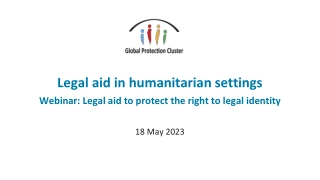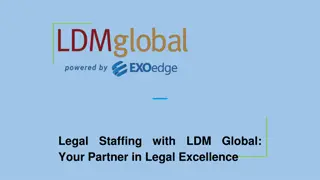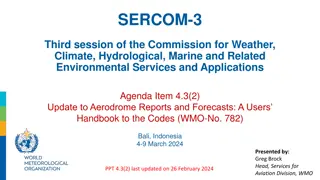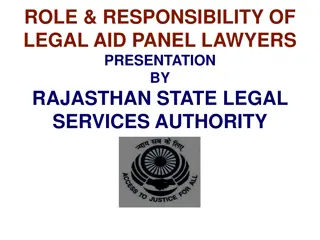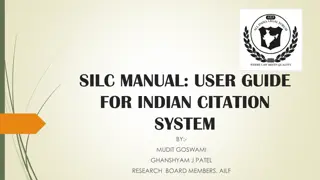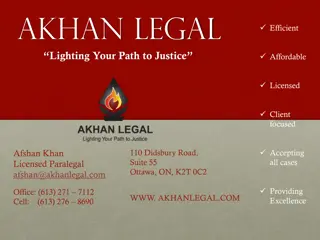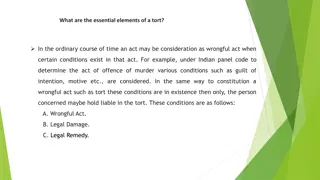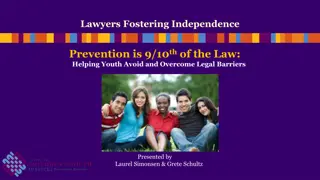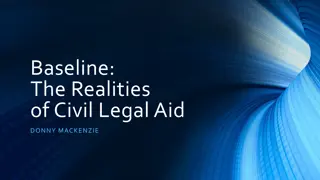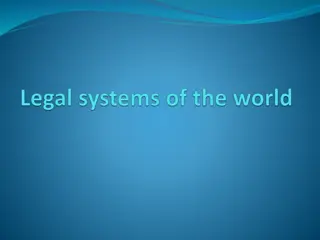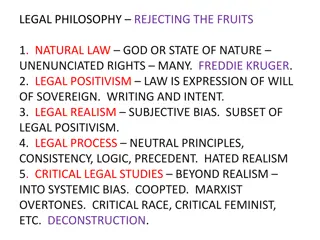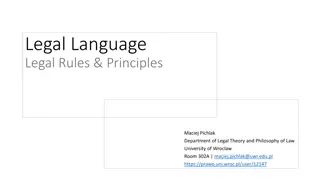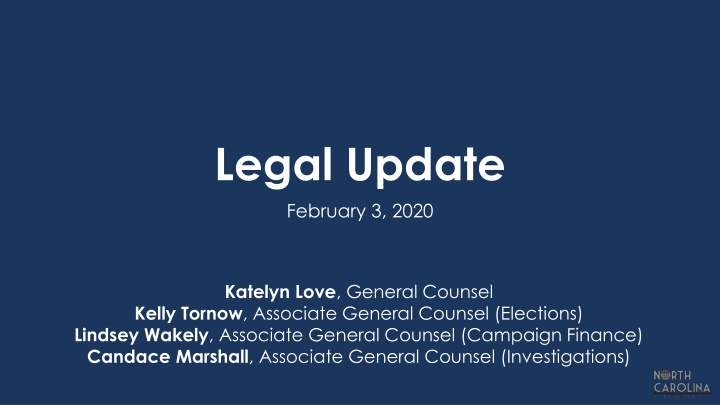
Legal Update: Key Developments in North Carolina's Election Landscape
Stay informed with the latest legal updates in North Carolina's political sphere, including recodification changes, litigation updates, and notable cases such as the NAACP v. Cooper preliminary injunction. Explore the evolving landscape of campaign finance regulations and odd scenarios that impact the state's electoral processes.
Download Presentation

Please find below an Image/Link to download the presentation.
The content on the website is provided AS IS for your information and personal use only. It may not be sold, licensed, or shared on other websites without obtaining consent from the author. If you encounter any issues during the download, it is possible that the publisher has removed the file from their server.
You are allowed to download the files provided on this website for personal or commercial use, subject to the condition that they are used lawfully. All files are the property of their respective owners.
The content on the website is provided AS IS for your information and personal use only. It may not be sold, licensed, or shared on other websites without obtaining consent from the author.
E N D
Presentation Transcript
Legal Update February 3, 2020 Katelyn Love, General Counsel Kelly Tornow, Associate General Counsel (Elections) Lindsey Wakely, Associate General Counsel (Campaign Finance) Candace Marshall, Associate General Counsel (Investigations)
Overview Recodification Litigation Update Legislative Update Campaign Finance Odd Scenarios
Recodification Update Chapter 163A recodified back to Chapter 163 in 2019 New law books on order Election Law Index being updated
Photo ID Preliminary Injunction NAACP v. Cooper, 1:18CV1034 (M.D.N.C. Dec. 31, 2019) Federal district court enjoined photo ID requirement on Dec. 31, 2019 (order) Injunction prohibits implementation of voter ID requirements until otherwise ordered by the court Photo ID is not required for the primary for any method of voting (absentee or in-person) CBEs stopped issuing Voter ID cards CBEs must post signage at office and every voting site
Photo ID Preliminary Injunction NAACP v. Cooper, 1:18CV1034 (M.D.N.C. Dec. 31, 2019) Forms, instructions, materials, voter card updated accordingly (see Numbered Memo 2020-01) State Board sent mailer to 4.7 million NC households informing them of injunction Trial to take place in coming months AG s office appealing injunction to 4th Circuit
Holmes v. Moore (State Court Photo ID Case) 18 CVS 15292 (Wake County Superior Court) Case involves state constitutional challenge to photo ID law Denial of preliminary injunction by 3-judge panel on appeal before NC Court of Appeals Status: oral argument held on January 22
Other Litigation of Interest NC Democratic Party v. State Board: challenges early voting restrictions, including hours requirements Status: briefing ongoing Buscemi v. Bell: Challenge to ballot access rules by petition and write-in for unaffiliated presidential and congressional candidates Status: federal district court dismissal of case on appeal to 4th Circuit
Other Litigation of Interest Common Cause v. Lewis: state redistricting case on appeal to 4th Circuit Legislative defendants claim case should have been removed to federal court Seek return to old districts Status: oral argument held on January 31 Community Success Initiative v. Berger: state constitutional challenge to ban on voting by felons not currently incarcerated Status: briefing ongoing
Absentee Changes Session Law 2019-239 Absentee request form must now include: Date of election for which ballot is requested Name and address of assistant, if voter receives assistance from someone other than near relative or legal guardian. Only applies to voters who need assistance due to blindness, disability, or inability to read or write. Starting January 1, 2020, request must be on new form Request on old form is invalid because S.L. 2019-239 requires that the form indicate if the voter received assistance
Absentee Changes Session Law 2019-239 Who may complete and return the request form? Voter Voter s near relative or legal guardian MAT team on behalf of voter How may the form be returned? In person By mail or designated delivery service (Not valid if submitted by email or fax)
Absentee Changes Session Law 2019-239 Absentee register The lists of absentee by-mail requests are now confidential until polls open on Election Day The list of returned ballots is not confidential and will be updated daily County boards and State Board must still inform the voter or voter s near relative or legal guardian of the status of voter s absentee request upon inquiry Container-return envelope Outside of container-return envelope cannot display voter s party affiliation
Absentee Changes - New Crimes G.S. 163-237, amended by Session Law 2019-239 Intentionally, with intent to obstruct a vote, failing to deliver or destroying completed absentee request, application, or ballot (Class G) Copying or retaining absentee request, completed application, or any identifying information therein (Class G) Selling or attempting to sell completed absentee request, application, or ballot (Class I)
Absentee Changes - New Crimes G.S. 163-237, amended by Session Law 2019-239 Compensating or accepting compensation based on number of returned absentee requests (Class I) Committing a crime identified in G.S. 163-82.6(b), 163-226.3(a), 163-274, 163-275, or attempting or conspiring to attempt such a crime, with the intent to unlawfully influence or interfere with an election, or to otherwise unlawfully gain (Class F) Disclosure of absentee requests register prior to opening of the polls on Election Day, for purpose other than conduct of business at CBE (Class G)
One-Stop Voting Changes Session Law 2019-239 Restores last Saturday of early voting Early voting now begins on the third Thursday prior to Election Day and ends on the last Saturday before Election Day County boards of election must conduct one-stop voting at all early voting sites (including the county board of elections office) on the last Saturday from 8am-3pm Changes weekday one-stop hours Mandatory weekday hours are now 8am-7:30pm (instead of 7am-7pm) Uniform site and hour requirements still in effect
Other Legislative Changes Testing voting equipment in simulated election (Session Law 2019-239) A county board of elections can now test a new voting system in a simulated election in accordance with standards established by the State Board Absentee voting now allowed in fire district elections (Session Law 2019-136)
State At-Large Observers G.S. 163-45, amended by Session Law 2018-144 Allows the chair of each state political party to designate up to 100 additional at-large observers This is in addition to the two precinct-specific observers and 10 county at-large observers appointed by the county political party chair As a courtesy, the State Board will forward a copy of these lists, if received from the political parties, to the CBEs Only one at-large observer per political party may be in the voting enclosure at any time. See 08 NCAC 20 .0101 for additional information.
Littering Statute G.S. 136-32, amended by S.L. 2019-119 A political sign in the state highway system right-of- way more than 40 days after an election is deemed unlawfully placed and abandoned and may be removed by any person without penalty Requires a municipality that regulates political signs in the right-of-way to adopt this requirement for municipal-owed roads Reminder: Neither the State Board nor the county boards regulate political sign placement
Political Advertising G.S. 163-129 and 163-166.4(c), amended by S.L. 2019-119 Requires CBEs to ensure each voting place allows candidates to place political advertising at site 36 hours before voting place opens and retrieve 36 hours after close of voting place Public buildings must comply with this requirement CBEs are required to attempt to secure these terms of agreement with non-public buildings. Building may still be used the agreement is refused.
Disclosure Legend G.S. 163-278.39 A print media, radio or television advertisement that must be disclosed as an expenditure, contribution, independent expenditure, or electioneering communication of the sponsor must have a disclosure legend Pens, hats, t-shirts, bags, balloons, etc. DO NOT require a disclosure legend Print Media "Print media" means billboards, cards, newspapers, newspaper inserts, magazines, mass mailings, pamphlets, fliers, periodicals, and outdoor advertising facilities. G.S. 163-278.38Z(7) All cards, pamphlets, and fliers require a disclosure legend, regardless of size
Billboards and Outdoor Advertising Any billboard or outdoor advertising smaller than 24 inches x 36 inches (2 feet x 3 feet) does not require a disclosure legend This is true for yard signs, portable signs and large magnetic signs affixed to billboards There has been some grey area with billboards between 24 inches x 36 inches and 6 feet x 6 feet
Authorization Statement G.S. 163-278.39(3) If a print media advertisement supports a clearly identified candidate(s), the sponsor must state whether the advertisement was sponsored by the candidate PAIDFORBY [NAMEOFSPONSOR]. AUTHORIZEDBY [NAMEOF CANDIDATE], CANDIDATEFOR [NAMEOFOFFICE]. PAIDFORBY [NAMEOFSPONSOR]. NOTAUTHORIZEDBYACANDIDATE. The authorization statement is NOT required if the advertisement is sponsored by the candidate it supports or by that candidate s committee
Font Size G.S. 163-278.39(b) In calculating the font size for the disclosure legend, you should look to the height of the printed space In evaluating the printed space, look to the area covered by the printed design (this would include any background), not just the area covered by the printed font
Legislative Changes: Electioneering Communications G.S. 163-278.6(8j) An electioneering communication is any broadcast, cable, satellite communication, mass mailing or phone bank that has all of the following characteristics: 1. Refers to a clearly identified candidate for elected office. It does not expressly advocate for the election or defeat of the candidate. 2. In the case of the general election in November of the even- numbered year is aired or transmitted within 30 days of the election for that office. 3. May be received by either: a. 50,000 or more individuals in the state in an election for statewide office or 7,500 or more individuals in any other election if the form of broadcast, cable, or satellite communication. b. 20,000 or more households, cumulative per election, in a statewide election or 2,500 households, cumulative per election, in any other election in the form of mass mailing or telephone bank.
Legislative Changes: Campaign Finance Complaints G.S. 163-278.22(7) Complaints must be: Signed and sworn under oath or affirmation By a registered voter All investigations shall be confidential No investigation shall be initiated more than four years from the earliest of the following dates: The facts constituting the violation are known to the State Board or county board with jurisdiction. The facts constituting the violation can be determined from the public record. The complainant knew or should have known of the conduct upon which the complaint is based. An optional Campaign Finance Complaint Form is available on the State Board s website. The State Board adopted a Campaign Finance Complaint Policy in December 2019.
2020 Campaign Finance Manual Update Updates include new sections on: Independent Expenditure Filers Party Headquarters Building Fund Special Contributors Federal Political Committees Electioneering Communications Specific guidance on how to report the principal occupation for employed contributors, self-employed contributors, consultants and retirees A contributor who is not employed at the time the contribution is made, and maintains no active professional license, may be reported as having no job title or profession and not employed In addition to payee name, complete mailing address and amount, for both media and nonmedia expenses, a list of acceptable and unacceptable purpose descriptions Staff will not seek a more detailed purpose description during an examination of campaign finance reports if the committee uses one of the acceptable purpose descriptions
Odd Scenarios Tie in cross county municipal contest Candidate files on last day of filing period; check returned for insufficient funds two weeks later Filed town council candidate wins; also wins as write-in candidate for mayor (Tuman v. State Board)
Odd Scenarios Congressional candidate registered to vote just prior to filing; claimed affiliation based on recognition in the media; argued case should be heard by panel of county board members In re D Abrosca (State Board, Jan. 15, 2020): As the entity that cancelled the candidate s notice of candidacy, the State Board is the proper entity to hear and decide this matter. A person declares their affiliation by registering to vote and indicating the party with which they affiliate on the voter registration application.
Questions? Legal@ncsbe.gov

